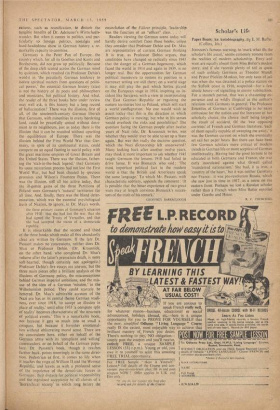Scholar's Lire
Paper Boats: An Autobiography. By E. M. Butler. (Collins, 16s,)
JOHNSON'S famous warning, to 'mark what ills the scholar's life assail,' seems curiously remote from the realities of modern scholarship. Envy and want are equally absent from Miss Butler's modest story, and if she records plenty of toil in quest of such unlikely Germans as Theodor Mundt and Prince Puckler-M uskau, her only taste of jail was when she was detained at a police station on the Suffolk coast in 1916, suspected--for a few idiotic hours—of signalling to enemy submarines. For a staunch patriot, that was a chastening ex- perience and as wildly illogical as the author's relations with Germany in general. The Professor .Emeritus of German at Cambridge is no naive enthusiast for the nation and the literature of her scholarly choice, the choice itself being largely the result of accident. Of the 'two opposing currents' of French and German literature, 'each of them equally capable of sweeping me away,' it was the German current on which she eventually set sail her paper boats. But there can have been few German scholars more critical of • modern trends in German life or more sceptical of German. intellectuality. Having had the good fortune to be educated in both Germany and France, she was early inoculated against what Orwell called 'transferred nationalism.' She had, it is true, a 'country of the heart,' but it was neither Germany nor France: it was pre-revolution Russia, which she saw just in time in 1917, as a nurse on the eastern front. Perhaps we lost a Russian scholar rather than a French when Miss Butler enrolled under Goethe and Heine.
R. C. ClIURCIIILL


















































 Previous page
Previous page